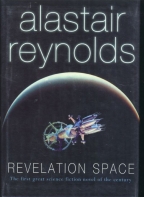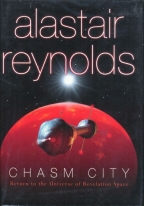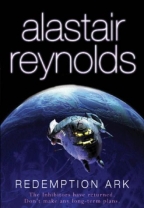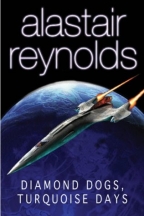The Horror From Another Genre
The Agony Column for January 27, 2002
Revised and
Expanded January 29, 2003
Commentary by Rick Kleffel
Since horror has been handed its own head -- strike that -- marked
space on the shelves at chain bookstores, it's really come into its
own as a dissed-with-reason genre, the kind of trashy books you're
allowed to read in the summer while tanning on the beach or in the
beauty salon while your brain is fried by the Martian mind-control
helmets installed in the mid-1960's.
But it hasn't always been that way. Horror wasn't always the
stupid stepchild of mystery and science fiction. Horror used to be a
part of everyday life and mainstream fiction. Since it's once again
become a part of everyday life, what with serial killers, snipers and
terrorists popping up like whack-a-moles in the penny arcade, and the
world once again comfortably on the brink of constant annihilation,
perhaps horror can once again assert its cross-genre presence as
something larger than monsters and more interesting than men with
knives. One of the reasons I started reading what was slapped between
foil covers and served up in plus-sized slabs of paper was that the
horror genre seemed to offer good writers a lot of leeway to write
any damn kind of book they wanted to write. Science fiction, romance,
mainstream, literature -- horror could encompass them all, as long as
it had a gerund title and a picture of a child in peril on the
cover.
In a recent interview
with Ramsey Campbell, this subject came up, and it dovetailed
perfectly with a suggestion for a column from reader David Lee Hatch.
He then wrote me back after I posted the original column and reminded
me that I'd missed an entire and obvious genre. So I'm back again,
revising and expanding. I'll plead that I was suffering from the
effects of teenager radiation. For those who have already read the
column, I've added the entire fantasy genre as a source of horror.
You can jump to this link to find the
new material. I've also added some comments on the science fiction
choices I made, which you can find
here. And finally, I've added some
reader's suggestions here. As ever, I find myself typing away
madly at 4.30 AM and once again stacking books from all corners of
the house on the dining room table. And now
that the horror genre is dead, it needs a bit of spark from other
genres to bring it if not into favor, then at least back to life.
Since Edgar Allen Poe invented both the mystery and the horror
story, it's not surprising that the mystery genre has proved to be a
reliable source of invasions, incursions and explorations into
horror. It's also one of the major reason that horror is no longer
viable as a ghettoized genre. Via the mystery genre, horror has left
the ghetto and contaminated the mainstream.
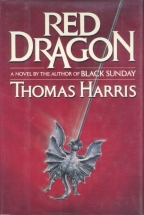
|
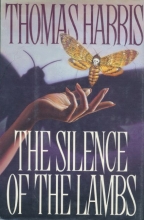
|
|
Here's a shot of the first edition hardcover of the
start of Thomas Harris's famous 'Hannibal Lecter Trilogy'.
Or, it's a trilogy until the next book comes out, at which
point it becomes either a series or a quartet, depending on
the sales outlook.
|
This is one of the most important horror novels of the
past 50 years.
|
Probably the biggest entrée for over-the-top horror into
the popular consciousness was the novel 'Silence of the Lambs' by
Thomas Harris. If you haven't heard of this novel, or seen the
letter-perfect movie adaptation, then you need to come down off the
mountaintop. 'Silence of the Lambs' made the horror genre -- or genre
horror, more precisely -- disappear. There was nothing left for the
punks to splatter after Thomas Harris took it all apart with surgical
precision in his carefully crafted character study of FBI trainee
Clarice Starling and psychopath Hannibal Lecter. Harris hit all the
grace notes of a full-blown supernatural horror novel without ever
resorting to the supernatural. His depictions of horrific scenes and
his ability to create flesh-crawling terror were serving the needs of
a story of fully developed characters in conflict, compromise and
consent. Harris didn't flinch in what he revealed, nor did falter
when he restrained. 'Silence of the Lambs' is the kind of balancing
act that many readers think is too good to be called horror.
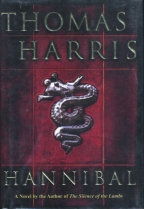
|
|
This is not one of the most important horror novels of
the last 50 years. The disappointment was audible.
|
Harris is responsible for the monster he created, and 'Hannibal'
his follow-up to 'Silence of the Lambs' was more than disappointing
for the wide following he had gained. Harris made a tough choice to
follow both the characters and the horror, and his tale alienated
readers who were expecting a more sympathetic psychopath combined
with a more confident cop. Instead, we were served a good deal more
horror than most wanted, with characters turned in precisely opposite
the direction most readers had hoped for. All of this would have been
a lot more forgivable had the twists in plot been as unexpected as
those of character. 'Hannibal' is literally all over the place.
Instead of lucid, we get ludicrous; in place of intricacy, we get
incoherence. Even characters we liked a lot doing exactly what we had
hoped for would have been hard-pressed to make this novel as
enjoyable as we wanted, given the hoops that Harris has set in place.
Yes, 'Hannibal' might have found it hard to live up the mountainous
expectations that awaited it. Ten years in the making and the careful
prose of 'Silence of the Lambs' left readers with the impression that
Harris was handcrafting a masterful follow-up to an unanticipated
masterpiece. In any analysis, however, 'Hannibal' failed to match the
quality of 'Silence of the Lambs'.
Still, the effect on the horror genre and mainstream literature
was volcanic. We still can't get rid of novels that promise
characters as compelling as Hannibal Lecter, in either mainstream
thrillers, mystery novels or the foil-wrapped horror ghetto. That's a
monster that Harris is not responsible for. For those fallen forests
of bad books, we can lay the blame firmly at the feet of the
publishing industry, which failed to recognize that Harris's original
work was so popular not because it was about a serial killer, but
because it was well-written. Still, 'Silence of the Lambs' stands the
test of time as a compelling invasion and use of the horror genre by
a mainstream mystery writer.
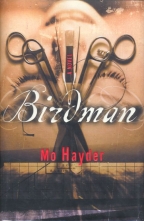
|
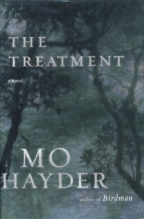
|
|
Mo Hayder's 'Birdman' had some evocative locations but
an annoying protagonist.
|
The protagonist and his gal are still annoying, but
the criminals are electrifyingly good in 'The
Treatment'.
|
For those looking for something a tad more recent -- and not as
well known -- as 'Silence of the Lambs', Mo Hayder's 'The
Treatment' might be a good place to start. Hayder's first novel,
'Birdman' was firmly
in the Lecter-ripoff category, including the egregious cover blurb
comparison. But she's working the police procedural mystery beat with
a definite flair for creating a moist, wet London and an annoyingly
depressed cop. His (literally) tortured artist girlfriend doesn't
help matters much. But when Hayder gets round to talking about the
petty criminals and small-time scum who inhabit the world of
pedophilia and child molestation that she creates, she hits a nerve
like nobody's business. You're going to have to have a strong stomach
for scenes of children in peril and beyond to read this novel, but
it's an amazingly effective evocation of nearly supernatural-seeming
horror that never leaves the gritty grottoes of reality. A follow-up
is definitely called for, and despite the bad taste that this novel
left behind, I'm quite interested in seeing what happens next.
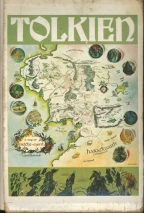
|
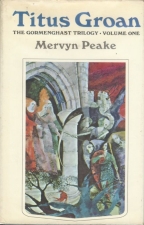
|
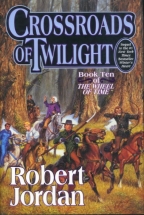
|
|
I tried but failed to pry the books out of this 1970's
vintage box set of Tolkien. I resorted to a kitchen knife,
but they're really, really stuck. Part of this are effective
horror set-pieces.
|
This 1960's vintage edition of Peake is a great find.
It includes all the illustrations that Peake himself
created. I occasionally read aloud Lord Sepulchrave's dinner
reverie.
|
Robert Jordan's number one best-selling fantasy has
oodles of horror inside, including a very fine set piece in
a town haunted by something we never quite see.
|
Since much of what used to be called horror is now called 'dark
fantasy', it's no surprise that fantasy make use of the horror genre
on a regular basis. It's often done as part of a fantasy series.
Surely large parts of many famous fantasies are categorizable as
horror. Tolkien's scenes in Moria and Mordor are fine set pieces of
both cosmic and personal terror. In 'Titus Groan', Mervyn Peake
offers a number of scenes of comic terror, as Lord Sepulchrave goes
slowly mad. Robert E. Howard dripped blood and split skulls in his
Conan stories, but the thrust of the stories was more on the fantasy
side of the equation rather than the horror side. Both Lovecraft and
Clark Ashton Smith crossed back and forth between fantasy and horror,
as did their inspiration, Lord Dunsany.
Robert Jordan does a very fine pastiche of Dracula in his latest
novel, 'Crossroads
of Twilight'. Any reader who has not yet checked out Brian
McNaughton's 'The Throne of Bones' should hie themselves hence and
pick up this fabulous fantasy penned by a horror writer. It's totally
over-the-top flesh-eating fun, but in the final analysis, fantasy
that incorporates horror. But surprisingly, the number of fantasy
writers who write full-blown horror is not as great as one would
suspect.
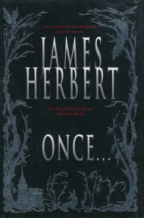
|
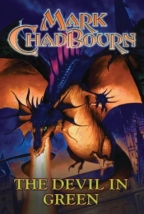
|
|
James Herbert gets down with horny fairies and other
creatures from the fantasy pantheon in 'Once...', which is
probably enough.
|
Mark Chadbourn has one foot in the world of horror and
one foot in the world of fantasy in his newest novel. How
could I forget this stuff -- this is one my more favorite
series. If you like either horror or fantasy, then give
these books a try.
|
A number of horror writers have used fantasy genre tropes to
bolster their horror novels with varying success. James Herbert tried
to incorporate stories of faerie into 'Once…',
but the integration consisted mainly of hot sex with ethereal women.
Mark Chadbourn, on the other hand, is a fascinating absolute
middle-of-the-road success. Is he a fantasy writer writing horror or
a horror writer writing fantasy? I'd trend towards the latter take,
but in any event his 'World's
End', 'Darkest
Hour' and 'Always
Forever' are terrorizing novels of horror that bring fantasy
elements to life. His newest novel, 'The Devil in Green', continues
the tales told in this world but with a new set of characters. It's
an interesting way to extend the life of a series by exploring the
fascinating world he's created with a new set of characters. Science
fiction writers do this all the time, but it's not as common in the
horror and fantasy world. If you were to consider him a fantasy
writer, then you would certainly consider his PS Publishing novella
'The Fairy
Feller's Master-Stroke' a very effective invasion into the horror
world that most assuredly uses elements of fantasy fiction.
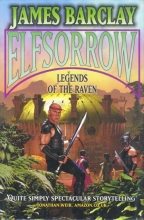
|
|
James Barclay effectively uses elements of stalking
terror in his latest fantasy novel.
|
James Barclay is another fantasy writer who uses large elements of
horror in his work. 'Dawnthief',
'Noonshade' and
'Nightchild' all
incorporate lots of horrific monsters and violence. Barclay shows a
gleeful willingness to execute major characters in violent and
emotionally wrenching scenes. It gives his fantasy a gritty edge of
realism, while taking it over the edge into horror. His latest novel,
'Elfsorrow' is
probably the most horrific of all, incorporating scenes where readers
will find themselves fearing the good guys. There are absolutely
terrorizing visions of characters we like and dislike being stalked
by characters we like and dislike. Barclay crosses the sympathy
border so often as to positively erase it with his footsteps. For
readers who enjoyed the movie 'Predator', there are scenes of jungle
stalking here that will bring back the best parts of that film. But
once again, this is not an invasion of the horror genre, but rather a
use of horrific techniques in fantasy fiction.
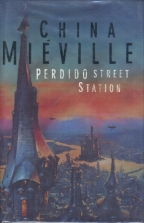
|
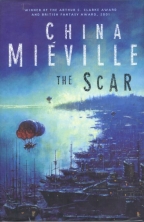
|
|
Chine Mieville writes fantasy that is so thoroughly
laced with horror that some readers find it too much. They
surely don't know what they're missing.
|
Mieville's 'The Scar' has a terrifying scene set on an
island of vampires the likes of which you've never seen
before. He has a few slightly more standard-issue vampires
as well.
|
China Mieville bears some mention here as well, but once again,
he's more of a horror writer who's turned to fantasy and taken his
grue with him. His first novel, 'King Rat' was an out-and-out
contemporary horror novel. He then turned to what I'd call science
fantasy with 'Perdido Street Station' and 'The Scar'. Both are set on
the created-by-Mieville world of Bas-Lag, which is populated by lots
of very bizarre and alienesque critters and races. 'Perdido Street
Station' features some monster of a Lovecraftian nature, while
'The Scar' has a
set-piece on an island populated by the nastiest vampire-like
thingies you'll ever have the displeasure to read about. Yes, both
novels feature horror, but both are essentially science fantasy at
heart. Their intent is to cause wonder -- mixed with nausea for some
readers. They are eminently successful on all levels. Now if 'The
Tain' qualifies as a contemporary horror novel -- I'm hoping to get
it in the next couple of days -- then perhaps we can peg Mieville as
a fantasy writer who invades horror. But in the interim, he'll just
have to be a great writer that readers should seek out and plan to
enjoy.
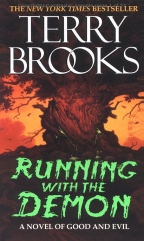
|
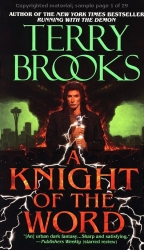
|
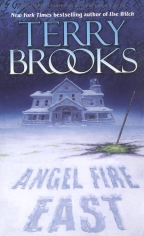
|
|
Terry Brooks was probably hoping to capture some of
that Stephen King audience with this horror novel
|
This horror novel gets the phrase 'dark fantasy'
blurbed right on to the cover.
|
Don't hate him because he's popular. But writing a
horror trilogy might be reason enough.
|
There are in fact at least two fantasy writers who have invaded
the horror genre with the full and obvious intent of writing novels
of terror, and who had in previous works, focused on big fat doorstop
trilogies. You never thought you'd be reading this name in this
column. Terry Brooks wrote 'The Sword of Shannara', which made
Tolkien fans around the world either joyful or furious. (I was in the
latter camp when they came out -- I remember seeing them in the
college bookstore at U. C. Irvine and ranting about them. But I'll
admit that back then I was also already tired of Tolkien as well.) He
then paid for several mansions (I hope) with innumerable follow-ups
and almost single-handedly established the Generic Celtic Fantasy
Industry. Now, since I haven't read any of these, and don't intend
to, I can't really speak to them other than to say they don't look
like my cup of tea.
But Brooks, like any good industrialist, knew a huge fan base will
follow a writer if they don't stray too far, and so in 1998, he
released a full-blown mainstream-style horror novel titled 'Running
With the Demon'. I have to admit that I gave it more than a few
glances back then, and it still seems that it might have a
slack-jawed-read-n-drool appeal, if I had enough time to read it. But
no doubt, Brooks is a fantasy writer who invaded the horror world
with enough success to get a horror trilogy published. What else
would you expect from a fantasy writer? He followed up 'Running With
the Demon' with 'A Knight in the Wood' and 'Angel Fire East'. 'A
Knight in the Wood' gets the "dark fantasy" label blurbed right on
the to cover, since horror is a dirty word as far as publishers go.
Apparently that was enough horror, however, since he's now returned
to Shannara.
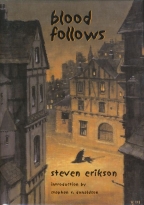
|
|
Steven Erikson's atmospheric tale from the Malazan
empire might really be appealing to Mieville's fans. Though
they're set in a fantasy world, the novellas themselves are
very much in the horror genre, with a creeping sense of
menace. No quests or battles here!
|
A fantasy writer who has three doorstops out but has taken the
time to pen some wonderful novellas of horror is Steven Erikson. His
2002 novella 'Blood
Follows', was good enough to make me buy his doorstops, and I
look forward to the time when I can get round to reading them. But
even though it's set in his fantasy world of Malazan, 'Blood Follows'
is nice little tale of toe-tapping terror. The second tale in this
series of novellas, 'The Healthy Dead', also featuring Bauchelain and
Korbal Broach, is due out any day now from PS Publishing. Erikson's
evocation of the city Lamentable Moll, haunted by demons and other
supernatural entities is powerful, urban and moody. Readers who like
atmospheric supernatural horror would be well advised to find these
scarce novellas. It's rather surprising to me that there haven't been
more fantasy writers who have attempted what Brooks in particular
tried. Yes, there's a lot of cross pollination between the genres,
but not so much invasion from fantasy into horror. Perhaps the right
explanation comes from the innumerable mystery novels where the
advice is to 'Follow the money'.
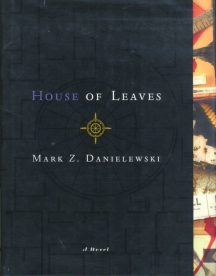
|
|
This novel has an index. Don't say you weren't warned.
|
Since it's so absurdly easy to write a horror novel, writers of
highfalutin' literature do so on a regular basis. Once you've swept
away the detritus left behind by their often-embarrassing attempts
(after all, it was only a lark to write a horror novel) some
well-heeled successes show themselves. For a huge novel of brooding,
cosmic supernatural terror that is so literary it hauls itself
clearly over into the realm of the experimental, you need look no
further than Mark Z. Danielewski's 'House of Leaves'. If any author
ever wanted to sign up for the More Metafictional Than Thou award,
it's Danielewski. This is a novel with an index.
Danielewski is clearly having way too much fun in 'House of
Leaves'. He pushes the envelope, then tears it into shreds and sets
it on fire with typesetting that must have had his exceedingly
generous and permissive publisher, Pantheon tearing their hair out in
clumps. But the result is a powerful, utterly weird novel of
dislocation and darkness. Don't expect a page-turning thriller here,
though the pages will turn and there are plenty of thrills. Instead
prepare for an immersive reading experience unlike any you've yet
encountered. On the flip side of this is the potential that the novel
will utterly alienate some readers, proving too difficult for the
rewards that it parses out. Here's a novel that absolutely requires
effort to read, and repays it in kind. Still, climbing Mount Everest
requires effort and repays it in kind. That doesn't mean that every
reader will find the reward justifies the effort. But this is ever
true of experimental and literary fiction. 'House of Leaves' is an
excellent example of what happens When Experimental Literary Writers
Attack. It may not make a great television series, but it certainly
can make for compelling reading.
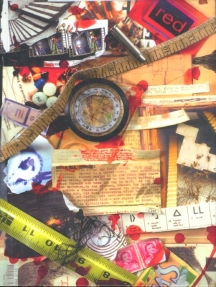
|
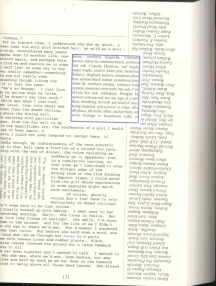
|
|
Here's the book cover beneath the dust jacket of
'House of Leaves'. The chaotic look gives some idea of
what's up with the novel
|
The portion of text in the blue inset lines is
actually reversed text from the following page. More fonts
here than at Adobe!
|
'House of Leaves' is a book that demands that you pick it up, page
through it, look at it, put your toes in the water before diving in.
It's the kind of book that makes bookstores worth visiting, and
leaves the Internet storefronts swinging in the wind. Even if it does
not sound like a book you'd enjoy, you should certainly take the time
to visit your local independent bookstore and page through to see
what a talented writer, no a talented artist can do, having applied
himself to the idea of writing an experimental horror novel.
Pantheon, having suffered a long time, is to be congratulated for
getting output that looks so great, even in a trade paperback
version. I urge all readers to at least take a peek at this novel the
next time they're out shopping. You may not like it -- you may not
buy it -- but you'll certainly be glad you've seen it.
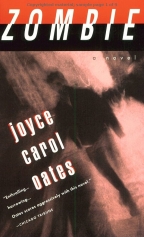
|
|
Joyce Carol Oates all-too-human killer made 'Zombie' a
very uncomfortable novel to read.
|
Danielewski's not the only literary writer to invade the horror
genre. Joyce Carol Oates invades so often, she's almost categorizable
as a genre writer herself. Her apotheosis of horror is 'Zombie', a
disturbing first-person narration by a serial killer that strikes us
not with its horror but its humanity. For all the reprehensible
things the narrator does, for all the terror he inflicts, it's the
observations that make him seem like us that are the most disturbing.
Oates' invasion of the horror genre was eminently successful, since
she won the Bram Stoker award for this fine, unsettling novel. More
importantly, she also garnered mainstream critical success and was
able to keep her label as a literary writer, though obviously at this
point she's on the darker side of the shelves.
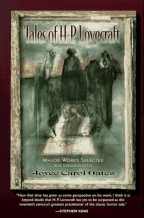
|
|
Joyce Carol Oates then lent her literary cachet to
Lovecraft with this collection of his stories selected and
introduced by Oates.
|
But 'Zombie' wasn't her only entrée into the horror genre.
In 1997, Ecco Press published the Oates-selected 'Tales of H. P.
Lovecraft'. The stories she selected comprise an excellent summation
of Lovecraft's best fiction. More importantly, for Lovecraft has been
collected ad nauseum, this particular selection was by a writer
largely accepted as a literary figure. Yes, Lovecraft has a lot of
fans in the speculative fiction world, and he generally receives the
regard he deserves; but in the world of mainstream literature, he's
still rarely regarded and not given the stature most aficionados feel
he deserves. Oates, a mainstream literary figure, certainly brought
some cachet to Lovecraft with her selection. An excerpt from her
perceptive introductory essay, can be found here.
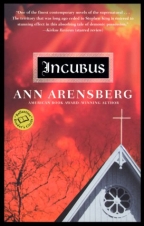
|
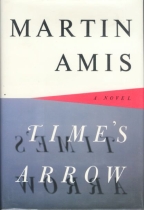
|
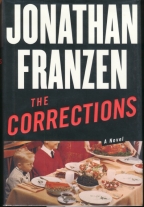
|
|
Anne Arensberg find horror in fortean happenings and
small towns.
|
Martin Amis used a science fictional device in a
literary horror novel.
|
You must have a very well-adjusted family to be able
to read this novel without cringing.
|
I'd love to hold my tongue, but it's not possible, apparently. So
I'm forced to mention the ever popular 'Time's
Arrow' by Martin Amis and 'Incubus'
by Anne Arensberg. 'Time's Arrow' plays the simple science fictional
trick of running time backwards, and the results are particularly
horrific when viewed from the point of a physician who got his start
during the Holocaust. Arensburg flirts with a massive dose of
Forteana, and comes up with a chilling and intriguing tale of a small
town invaded in the 1970's by entities that seem to be taking their
cues from John Keel. Of course, I could go on and on, from the
origins of horror and the novel itself, right up through 'The
Corrections' which is a rather chilling look at the today's
families. I don't need to beat my readers upside the head with this
-- mainstream and experimental literature are well-known for
birthplaces for successful, well-written horror fiction. The literary
invaders? We can only hope.
One might be tempted to think that science fiction readers and
writers would find a great kinship with horror readers and writers.
It's simply not the case. At Worldcon this year, I found myself
constantly amazed by the number of readers who didn't know -- or wish
to know -- anything about the horror genre, current horror writers,
or any horror fiction. It was pretty clear to me that most SF fans
looked down on horror as being beneath their notice, somehow scuzzier
than the more intelligent genre of Science Fiction.
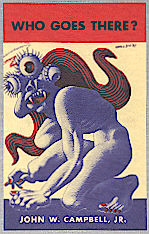
|
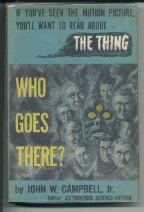
|
|
John W. Campbell, Jr. is one of those guys who
invented science fiction as you know it. Thank him -- I
think!
|
The movies based on his work had a pretty big impact.
The first version of 'The Thing' talked about the military
versus the scientific mind, while the second version tanked
the career of director John Carpenter, though it's now
acknowledged as a classic bit of film making. Or it should
be.
|
How this could happen in a genre that owes its birth to John W.
Campbell, Jr.? Arguably his finest and best-known story is 'Who Goes
There?' which deftly and perfectly mixes science fiction, horror and
mystery in equal portions to transcend time and space. Or, at least
time and space go away when a reader starts this classic story. Few
writers before -- other than horror writer H. P. Lovecraft -- and few
writers after -- whom I will shortly be naming -- have hit upon
Campbell's perfect-pitch ability to describe scenes of anatomical and
psychological terror as well as Campbell. Perhaps the presence of
horror in works that are so thoroughly science fiction and seem so
thoroughly science-fictional is the strongest argument that horror
itself is not a genre, but rather a literary tool that writers can
use to achieve a multiplicity of ends.
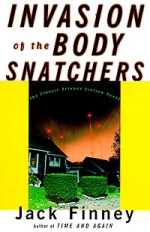
|
|
If you've only seen the movie based on this book, read
the novel. It's very witty and well written, as well as
terrifying.
|
For a meditation on identity and terror that follows directly from
Campbell's incept point to the McCarthyesque 1950's few can equal
Jack Finney's 'Invasion of the Body Snatchers'. They've made a couple
of excellent movies out of this source material, and it's not just
because the original novel has a good idea. Finney is a tremendously
skilled writer, and 'Invasion of the Body Snatchers' is still a
cracking good read, literary, terse and successful on all levels. You
all know the story, but most are probably not familiar with the easy,
sinuous power of Finney's prose. 'Invasion of the Body Snatchers' is
funny, slick, pointed and sharp as a box full of Ginzu knives. Here's
another book that shouldn't be judged by any of the movies made from
it, good or bad. The book stands on its own as a powerful statement
of how science fiction can be used to create pure and simple
terror.
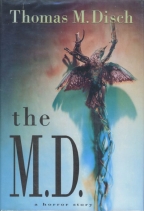
|
|
I can barely make myself think about certain passages
of this novel.
|
Readers of this column should have a pretty good idea of where I'm
headed next. While science fiction fans may not think too much of
horror, the horror 'genre' has been invaded by science fiction
writers on a regular basis. Thomas Disch's 'The M. D.' is a
toe-curling tale of terror reminiscent of more recent works by Graham
Joyce. In it, as a young boy, Billy Williams is bequeathed a vision
of Santa Claus, in reality the god of medical science, Mercury.
Williams is offered the caduceus, a talisman with the power to heal
and to kill. What follows is a horrifying, terrifying story of a
Faustian bargain. As an adult, Williams creates a plague only he can
heal. There are scenes in this book that readers will never, ever
forget, as illnesses are inflicted on the helpless in a fashion that
makes Lecter and company look positively beneficent. Tiny elements of
science fiction are used to bolster the horror that Disch unleashes,
with excellent effect. 'The M. D.' shows that Disch knows what horror
is all about.
These novels and novellas are a fantastic way to experience
well-written horror and science fiction simultaneously.
More recent invaders of the horror genre from science fiction
include Alastair Reynolds, Neal Asher and Richard Morgan. I wrote
an entire column on Reynolds' work as
horror, and probably don't need to belabor the point again here.
But readers who might have managed to miss Reynolds finely written
explorations of gothic horror in a science fictional setting need
look no further than (listed in chronological order) 'Revelation
Space', 'Chasm
City' or 'Redemption
Ark'. His latest release from Victor Gollancz, 'Diamond
Dogs, Turquoise
Days', consists of two novellas replete with creepy imagery and
ominous ambiance. Reynolds effectively creates the same emotions of
awe and terror evoked by both Ramsey Campbell and the movie
'Alien'.
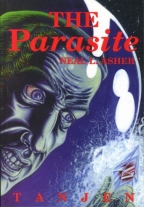
|
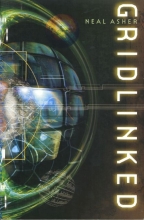
|
|
Even the cover of this first novella by Neal Asher was
terrifying.
|
'Gridlinked' is a bonified hoot of a novel. Enjoy it
now!
|
Neal Asher has been called 'the master of sci-fi horror' since
British specialty press Tanjen first issued 'The Parasite' in 1996.
With 'Gridlinked',
'The Skinner' and
the upcoming novel 'The Line of Polity', he has more than lived up to
that early label. Using broad, gripping strokes of blood-and-guts
prose, he builds up complex pictures of a universe that is hazardous
and voracious. 'Gridlinked' introduced Ian Cormac, a cross between
the Terminator and James Bond, tracking down insidious aliens and
horrifically altered humans in hostile environments. Asher's books
read like lightning and they seem simple until the reader is about
halfway through. That's when the accumulated detail and complexity
starts to impinge on a reading-unconsciousness that is tearing
through page after page with the same gusto Asher's monsters and
aliens gulp down human flesh.
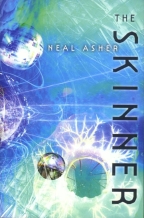
|
|
'The Skinner' is both page turning and complex. It's
easy to read and yet very satisfying.
|
'The Skinner' is set in the same 'Runcible universe' and details
the happenings on the planet Spatterjay, an ocean-based ecology that
proves every bit as complex as Frank Herbert's 'Dune' but a thousand
times more deadly. It's also a lot faster reading, as Asher spins
another seemingly simple story of three characters searching for a
fourth. Asher spray-paints his world in day-glo colors, predominantly
red and blue. For all the action, for all the gore, for all the
out-and-out slack-jawed-drooling-sci-fi-fan's-feast that Asher serves
up, 'The Skinner' is a remarkably calm and knowing novel. His
characters are not all sympathetic, but they're all fascinating and
readers will enjoy each one they meet and look forward to any
characters' appearance in the narrative. Such is Asher's skill that
AI subminds that other writers might leave on the sideline get fully
-- well, not fleshed, really, but certainly filled in with detail and
humor that makes even their appearances a joy.
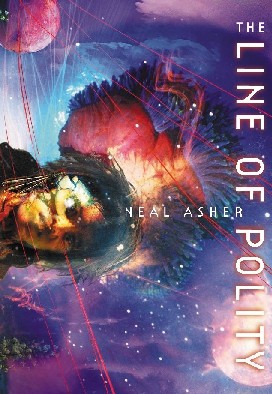
|
|
Asher's latest will satisfy his old fans and bring in
new ones. Look for it in March from Tor UK. Place your order
now to ensure a first printing.
|
Asher's latest novel, 'The
Line of Polity' ups the ante once again. It heralds the return of
Ian Cormac, in search of separatists and rogue scientists who have
turned themselves into weapons of mass destruction. Much of the
action takes place on Masada, a world that is about to fall under the
line of Polity and into Earth's control. That can't come a minute too
soon for the masses who live as slaves on the surface of the planet,
watched over by a Theocracy that controls them with space-based
lasers. As one might expect, there's room for quite a bit of topical
and timeless political commentary in such a story, and Asher rips
into his subject with a joy that is positively frightening to behold.
Just beyond Asher's tide of monsters and fairy tales, his humor and
horror, there's some very serious and rather angry thoughts. It's a
tribute to his writing skill that he manages his anger so
successfully in the novel format. 'The Line of Polity' is surely one
of the best science fiction books you're going to read this year.
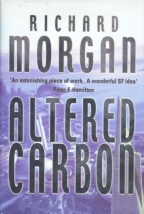
|
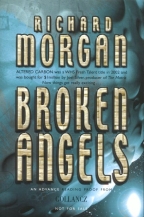
|
|
Richard Morgan's 'Altered Carbon' caught a lot of
people by surprise with it's intense scenario.
|
'Broken Angels' promises to reveal the universe behind
Morgan's first novel.
|
Finally, there's Richard Morgan, who brought science fiction and
mystery to horror's table in last year's 'Altered
Carbon'. Here was a science fiction mystery that gave 'Silence of
the Lambs' something to think about, but with a much more compelling
aspect of the classic American mystery. With all the cleverness of
his science fiction setting, with all the complexity of his
fascinating mystery, Morgan really mined the depths of horror in
creating a world where human consciousness can be re-sleeved into a
new body. That concept may not be new, but Morgan's exploration of
the consequences was filled with teeth-rattling scenes of gore and
awe that stretched quickly into terror. Morgan combined mystery and
science fiction to invade the horror genre with high-tech,
high-tension and powerful drama. 'Altered Carbon' is a novel for
almost every science fiction reader -- except those with a low
tolerance for horrific violence. A *very* informed correspondent
suggests that 'Altered Carbon' is not particularly horror. To a
certain extent, I can see this point of view, right up until I
remember some key scenes that in any perspective are, as I said above
teeth-rattling. But the vibe, to be honest is more mystery than
horror. However, Morgan's next novel, 'Broken
Angels', promises to extend his universe and achieve an even
grimmer level of despair, with the same compelling characterization
that kept readers' eyes glued to the page in 'Altered Carbon'. I'm
reading it at this moment, and I'll report my findings shortly. I
suspect that there will be a more Lovecraftian feel of horror,along
with ultra-violence that would leave little Alex with a big
smile.
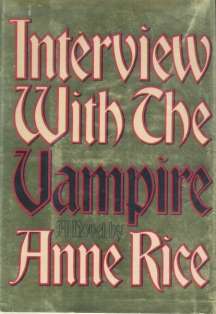
|
|
The Mother of All Foil -- the first edition of
'Interview with the Vampire' broke the foil barrier and cost
horror publishers millions in cheesy, expensive imitation
covers.
|
One genre readers might not expect to be invading horror is the
romance genre. But in point of fact, it's one of the most prevalent
sources of invasion. Remember that all horror fiction as once
classified as Romance fiction. And then look at the writer who is
quite probably the best-selling horror and romance author -- Anne
Rice. Starting with 'Interview with a Vampire', Rice forged a path to
the top of the bestseller list by writing gay romances with horrific
themes and characters. What else could you call the culinary journey
of 'Interview With A Vampire' other than the story of two men in love
and the meals they ate -- most of which happened to be human. Rice
continued her Grand Guignol love story across numerous sequels, and
even penned some kinky novels under an alias set in a B&D
vacation resort. She defied genre and convention and has been and
continues to be hugely successful.
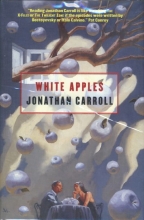
|
|
Is it horror, science fiction or romance? Whatever it
is it's definitely Jonathan Carroll's original vibe.
|
While Jonathan Carroll is usually pigeonholed with the science
fiction or horror writers, he considers all of his novels to be
romances, with supernatural overtones that stretch into awe and
terror. His latest novel, 'White
Apples' explores the complexities of love and the terror of the
unknown. He invades the horror genre by pursuing the ambiguities of
perception into the depths of an unknowable universe, where the rules
of a life can change on a dime, bringing back the dead, sliding
lovers from one time stream into another, confronting men and women
with fleshed-out concretizations of their deepest anxieties. Yes, in
every word and gesture, Carroll is talking about love, and to think
of it, what's more terrifying than being in love?
What becomes clear when one looks at horror from other genres is
that the horror genre is a lot more common than publishers and
booksellers and even readers may want to admit. Few mystery readers
will proudly proclaim that they enjoy violent scenes of human
dismemberment that achieve an almost cosmic terror hidden within the
depths of the human heart. But more than a few readers flocked to
read Harris' 'Silence of the Lambs'. Few literati will want to admit
that soul-wrenching cosmic terror is a mainstay of their mainstream
taste. But more than a few went way out of their way to enter 'The
House of Leaves'. Few science fiction readers want to wallow in
rivers of gore, but John W. Campbell's 'Who Goes There?' set the
standards that writers like Jack Finney, Alastair Reynolds, Neal
Asher and Richard Morgan meet and exceed with each new novel. Few
romance readers will rally to read about blood-sucking fiends. But
more than a few romance readers have followed the corpse-strewn path
of Anne Rice's Lestat to see if their favorite vampire can ever, ever
find true happiness.
Yes, it's possible to look at horror as that trashy little group
of books sadly stuffed together in the corner of Bordersarnes&*.
It's also possible that horror is the genre beyond all others. It's
possible that horror is not just a genre, but a most effective tool
to dig into the unconscious minds of readers and writers. Don't hate
horror because it is beautifully written and badly packaged. Horror
is everywhere. You can take it, as long as you're not afraid to look
in the mirror.
Thanks,
Rick Kleffel
Addendum 1/28/03:
Readers have responded with lists of their own -- and I think that
the suggestions are intriguing enough that others will want to see
what they suggest. I've got suggestions like this before, and I don't
know why it didn't occur to me until now to append them to the
column. Without further ado, then let me add the first two lists from
correspondents.
The first was the inestimable John Pelan, a wealth of information
and suggestions for fine reading:
Harry Crews - FEAST OF SNAKES, CELEBRATION (two name but a
couple)
Flannery O'Connor - A GOOD MAN IS HARD TO FIND (among others)
Joseph Conrad - HEART OF DARKNESS
Jim Thompson - THE KILLER INSIDE ME
Richard Lortz - LOVERS LIVING, LOVERS DEAD
Gordon Honeycombe - NEITHER THE SEA NOR THESAND
Stewart O'Nan - A PRAYER FOOR THE DYING
Cormac McCarthy - BLOOD MERIDIAN
Davis Grubb - NIGHT OF THE HUNTER (and many of his short
stories)
Hell, I could do this all night... (But I won't) ;-)
Cheers,
John Pelan
Next up is Randy Money -- and I agree with him on the Faulkner;
Randy if you like Faulkner (are you folks getting tired of this yet)
you owe it to yourself to check out William
Gay.
Let it rip Randy:
Okay, so I'll weigh in ...
_The Night has a Thousand Eyes_ by Cornell Woolrich (primarily
a
mystery writer)
_The Island of Dr. Moreau_ by H. G. Wells (s.f.)
_The Church of Dead Girls_ by Stephen Dobyns (lit.)
"Black Destroyer" & "Asylum" by A. E. Van Vogt (sf)
_The Three Stigmata of Palmer Eldritch_ by Philip K. Dick (sf)
_Fata Morgana_ by William Kotzwinkle (marginally horror by a
lit.
writer)
I also find William Faulkner's _Absalom, Absalom!_ frightening in
its implications, but suspect I'm on my own in thinking it marginally
horror.
I'll leave it at that.
Randy M.(Money)
And of course the eminently observant David Lee Hatch
suggests.....
Great article, though I was rather perplexed re: your lack of
fantasy--to my mind, fantasy is much more linked w/ horror than SF or
mainstream. I mean, think about it - both genres, horror and fantasy,
sort of go after an emotional rather than an intellectual response,
and both genres use the supernatural to instill a sense of awe and
fear. I mean, you listed many great examples of SF-horror, but even
w/ those, the "weird stuff" usually has to accounted for in terms of
workable scientific theory. And even some of the classic monsters of
horror fiction show up in fantasy - I'm thinking of CASmith and his
vampires, Brian Mcnaughton and his ghouls - hell, there's even
mention of werewolves in THE LAST UNICORN. And, of course, ghosts
frequently show up in fantasy tales as well. Anyway, I loved the
column, but was disappointed not to see things like Robert E. Howard
(Conan is all about fighting monsters!), Michael Moorcock, Tanith
Lee, Brian Mcnaughton, Michael Shea, Tolkien, Peake, stuff I know you
read!!!!





























